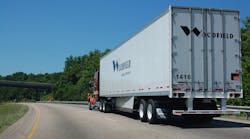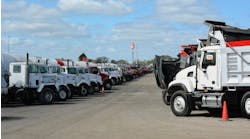The troubles facing trucking fleets are legion these days.
For example, cargo theft is a $15 billion to $30 billion a year problem, according to the Federal Bureau of Investigation, and still on the rise – with California a major hot spot for freight thieves.
For those motor carriers hauling foodstuffs, new transportation rules require them to provide a host of information about their shipment practices to ensure the goods they are carrying in order to help prevent foodborne illnesses.
Fortunately for trucking companies, trailer telematics can help in both areas and a few more for good measure.
Trailer telematics provider Blackberry Radar, for one, is conducting a free webinar this week to explain to fleets how improving the ‘intelligence’ of trailers can improve cargo security and food transport safety, along with other benefits.
Philip Poulidis, senior vice president and general manager for Blackberry Radar, sat down with Fleet Owner for a Q&A on the subject to share his perspective on how making trailers ‘smarter’ can help motor carriers address a range of issues:
FO: Talk about what the term ‘trailer intelligence’ means. Why is it an important concept that fleets need to consider when spec’ing trailer tracking solutions?
Poulidis: The trailer being hauled, whether it’s a dry van, container chassis or flatbed, carries valuable cargo. That cargo is essentially a shipper’s source of revenue. Ensuring payloads are picked up and delivered on time – and in the condition expected by a customer – is paramount to a motor carrier’s reputation and their level of success.
To do this consistently, you need reliable trailer intelligence. Not only will trailer intelligence help you become a better carrier, but it will improve your top and bottom line by way of increased revenue through missed opportunities, such as knowing when to charge detention fees, as well as by improving trailer utilization and productivity.
It takes an ‘intelligent’ trailer to make that happen and three key elements of a trailer tracking solution make it work.
First, the solution needs to include a device that can sense a variety of data points – such as location, door movement and environmental measures – and reliably collect and transmit that data at a meaningful frequency.
Second, it needs to have a secure communications channel that protects the asset’s data.
Third, the solution needs an analytics and reporting platform that transforms the data into insightful reporting, enabling fleet managers to make the right decisions for their business. Together, those three elements help deliver quality trailer intelligence.
FO: Protecting cargo is becoming critical today. For example, SensiGuard Supply Chain Intelligence Center (SCIC) recorded a total of 160 cargo thefts in the U.S. during the third quarter this year, with an average loss value per incident of $117,137. How can such technology help fleets help strengthen their cargo theft defenses?
Poulidis: From Wild West bandits robbing stagecoaches full of provisions to pirates on the high seas looking to intercept precious cargo, goods in transit have always been targeted by criminals, irrespective of geography, time period or mode of transportation. And while today’s criminals are a lot less inclined to mount an armed ambush, the major difference now is the level of threat response that today’s modern commercial carriers and logistics firms have at their fingertips.
With instant alerts providing real time information about fleet location and whether a cargo door has been opened or closed, fleets can give customers the assurance they need that their cargo is safe and secure.
The combination of location tracking and door information can help fleet managers respond quickly to theft events and can be used to build custom alerting to help support incident detection, while geo-fencing capabilities can allow trucking companies to build ‘virtual fences’ around high-risk areas.
Our BlackBerry system can also be used to monitor alerts on open doors, or extended stops in these high-risk areas to enable rapid response to theft. This translates into faster event detection, which gives fleet manager and law enforcement officials a major advantage.
FO: Food safety is another big topic today, with new rules aimed at eliciting more data regarding food transport. How can ‘trailer intelligence’ help here?
Poulidis: Consumers deserve a safe food supply and the commercial trucking and logistics industry plays a critical role in the journey from farm to fork. For sensitive goods like perishable produce, trailer tracking solutions allow fleets to monitor their cargo in near real-time, tracking everything from temperature, humidity, and trailer door status to cargo load state. That provides peace of mind to both customers and regulators alike that shipments are safe, secure and in full regulatory compliance.
Fleets can also set up real-time alerts should certain thresholds be exceeded to ensure actions can be taken before any loss in cargo quality.
While getting things like fresh tomatoes and avocados to the grocery store before they are past their best is often what people first think of when it comes to food transport, there are many industries – and products – whose success or failure are based on reliable climate controlled conditions.
For example, knowing that a shipment of expensive wine or pharmaceuticals is kept at the right temperature can mean the difference of millions of dollars if not properly monitored and managed.
From cherries to Chianti, cough medicine to chocolate, fleets that deploy trailer intelligence solutions, customers across a wide range of industries can ensure the safety and freshness of their products.
FO: Finally, maintenance data; can trailer intelligence help provide better maintenance data for greater unit uptime?
Poulidis: Without visibility into actual trailer use and productivity, trucking companies will typically set static schedules for trailer maintenance – regardless of the miles traveled. While this predictable scheduling ensures high-mileage/productive trailers are ultimately maintained in a timely and arguably proactive fashion, it is extremely inefficient for the low mileage trailers that require little to no maintenance at such frequent intervals.
Next-generation asset tracking systems can accurately measure miles driven and idle time to help determine a more cost-effective maintenance cycle based on actual usage.
With the rich intelligence that trailer tracking solutions provide, fleets can then make smarter maintenance decisions for their business and save time, money and resources in the process while keeping their valuable assets on the road longer.




